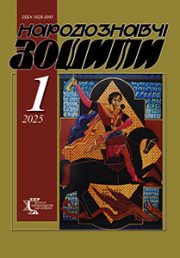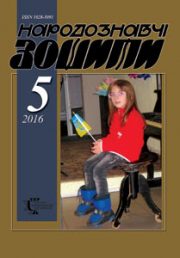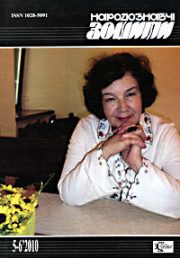The Ethnology Notebooks. 2024. № 1 (175), 70—75
UDK [572+39](477.46)(092)Але(045)
DOI https://doi.org/10.15407/nz2024.01.070
O. ALESHO’S ANTHROPOLOGICAL AND ETHNOGRAPHIC RESEARCH IN HISTORIC UMAN REGION
YOVENKO Larysa
- ORCID ID: http://orcid.org/0000-0003-1035-071X
- doctor of Pedagogical Sciences,
- Associate Professor of Ukrainian Literature,
- Ukrainian Studies and Teaching Methods Department,
- Pavlo Tychyna Uman State Pedagogical University,
- 2 Sadova Street, 20300, Uman, Cherkasy Region, Ukraine,
- Contacts: e-mail: yovenko310@ukr.net
OSIPENKO Natalia
- ORCID ID: http://orcid.org/0000-0002-7542-7821
- PhD in Pedagogy,
- Associate Professor of Ukrainian Literature,
- Ukrainian Studies and Methodology Department,
- Pavlo Tychyna Uman State Pedagogical University,
- 2 Sadova Street, 20300, Uman, Cherkasy Region, Ukraine,
- Contacts: e-mail: n.s.osipenko@udpu.edu.ua
Abstract. The purpose of the article is to study the life and creative works of Oleksandr Alesho in historic Uman region.
The research methodology embraces such methods as historical and retrospective (to establish the factors of the scientist’s personality formation; to study the experience of investigating Ukrainian studies, to analyse the concepts of anthropological and ethnographic research, to understand the fundamental concepts connected with the generalising characteristics of the Ukrainian people’s physical features); exploration and bibliographic (to study printed materials about O. Alesho, as it can help formulating scientific generalisations); biographical (to find out the scientist’s influence on the development of the Ukrainian culture).
The scientific novelty of the article combines both expanding the information about a prominent Ukrainian scientist Oleksandr Alesho and studying his life and creative works in the available scientific sources.
Conclusions. The analysis of the scientific works has shown that O. Alesho’s life and research achievements are closely connected with Uman city and historic Uman region, where the young scientist’s outlook and intellectual inquiries were formed. It is stated that while being a student, Oleksandr took part in numerous expeditions in Kyiv and Uman regions. O. Alesho’s report «Anthropological data on the Ukrainians in Uman district of Kyiv region» is known to become the basis for his research «Anthropometric studies of the Ukrainian population in Uman and Tarashcha districts of Kyiv region» (1919). In his work the author revised historical sources on the ethnographic composition of the population in Kyiv region, presented his own methodology of anthropological research and measurements of the population, and described the Ukrainian population according to anthropological indicators (eye colour, hair, height, size of feet and hands, skull height, etc.).
Keywords: O. Alesho, anthropological and ethnographic research, historic Uman region, investigation in Ukrainian studies.
Received 19.12.2023
REFERENCES
- Ruda, O.Z., & Verhunov, V.A. (Ed.). (2010). Oleksandr Havrylovych Alesho (1890—1922) — a researcher and a developer of Ukrainian science. Kyiv [in Ukrainian].
- Dziuba, I.M., Zhukovskyi, A.I., & Zhelezniak, M.H. (Eds.). (2001). Alesho Oleksandr Havrylovych (2001). Enceclopedia of contemporary Ukraine. Kyiv: Instytut entsyklopedychnykh doslidzhen NAN Ukrainy. Retrieved from: https://esu.com.ua/article-43763 [in Ukrainian].
- Nosiv, A. (1922). O.H. Alesho (9.II.1890—4.IV.1922) (obituary). Visnyk s.-h. nauky, 1, 40—42 [in Ukrainian].
- Alesho, O. (1919). Anthropometric studies of the Ukrainian population in Uman and Tarashcha districts of Kyiv region. Kyiv: Vydavnytstvo Ukrainskoho naukovoho tovarystva [in Ukrainian].
- Yashchurzhynskyi, Kh., & Syvachuk, N. (Ed.). (2014). Uman city. A brief historical sketch. In Human, 1—3, 8—40 [in Ukrainian].
- Borysenko, V.K., & Franko, O.O. (1990). People’s studies of O.H. Alesho. Narodna tvorchist ta etnohrafiia, 4, 20—23 [in Ukrainian].
- (1919). Khvedir Kindratovych Vovk as an anthropologist In Zbirnyk pamiaty Vovka (Pp. 25—30). Kyiv [in Ukrainian].
- Alesho, O.H. (1919). The Museum of Anthropology and Ethnography and Khvedor Vovk Anthropological Institute at the Ukrainian Academy of Sciences. Zbirnyk prats Komisii dlia vyroblennia zakonoproektu pro zasnuvannia Ukrainskoi Akademii Nauk u Kyievi (Pp. 26—30) [in Ukrainian].






